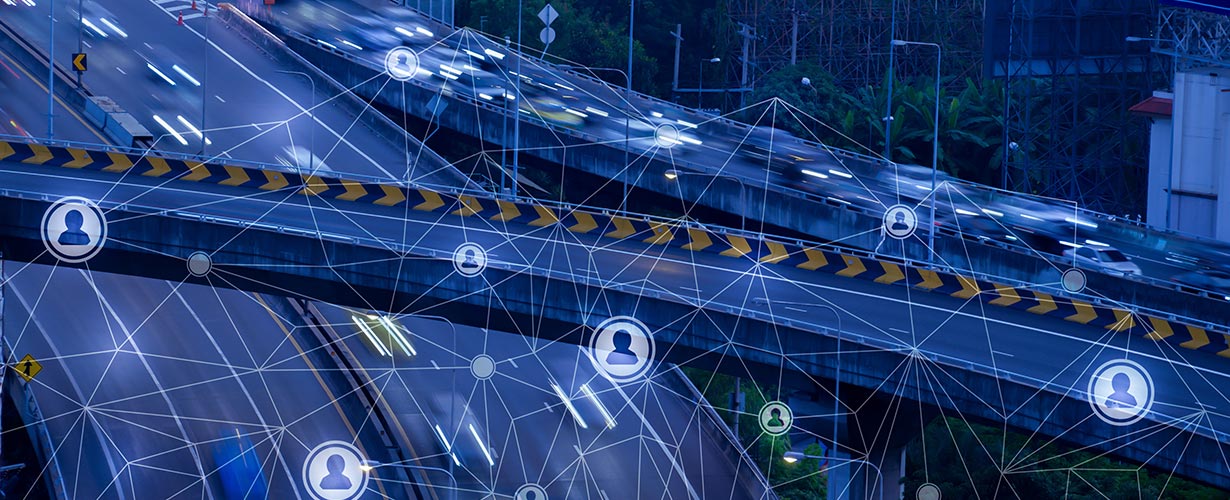The digital revolution is reshaping industries, enhancing their efficiency, effectiveness, and profitability. Among the transformative technologies, the Internet of Things (IoT) stands out, particularly in its impact on the transportation industry. In this blog, we will delve into the ways IoT has revolutionized the transportation sector.
The transportation sector is currently in the midst of a significant transformation, largely attributed to the swift integration of the Internet of Things (IoT). Through IoT, the transportation industry has established a cohesive network involving vehicles, infrastructure, and various devices. This has ushered in a fresh era marked by enhanced efficiency, safety, and sustainability within the realm of transportation.
IoT’s impact on transportation goes beyond conventional changes. It’s reshaping how we navigate the world, a concept often termed ‘intelligent mobility.’ This encompasses innovations such as:
- Connected vehicle technology: Numerous advancements occur in automobile technology., particularly in sensors, software, and other hardware that enable different vehicles to communicate with each other and infrastructure. Google Maps serves as a prime example, as it pinpoints a car’s location using GPS and provides real-time traffic updates with the help of mobile phones that are in vehicles with internet and location settings enabled. Software and hardware components of IoT technology, similar to this example, facilitate communication among vehicles and infrastructure. If used correctly it has the potential to enhance traffic flow, prevent accidents, and optimize fuel efficiency.
- Smart traffic lights: With the assistance of IoT software and hardware, we develop smart traffic lights that are already in use in some countries. These smart traffic signals utilize sensors, cameras, and radars to detect traffic conditions and adjust the timing of the lights accordingly. For instance, New York City boasts over 10,000 such smart traffic signals. If implemented on a larger scale, this technology has the potential to significantly reduce congestion, enhance traffic flow, decrease traffic accidents, and bring about a transformative change in transportation.
- Fleet management systems: These systems leverage IoT technology to monitor vehicle locations and statuses in real-time. This data-driven approach enhances operational efficiency, trims expenses, and elevates safety standards. By tracking vehicles via IoT, companies streamline routes, minimize costs, and ensure safer journeys, thus redefining the landscape of fleet management.
- Contactless payments: Toll collection has long been a major obstacle to smooth traffic flow, often resulting in lengthy queues at toll booths. However, the introduction of Radio Frequency Identification (RFID)-based systems has revolutionized toll collection, leading to cashless transactions in many countries. To utilize this system, vehicles are equipped with RFID tags for contactless payments. These tags can be read by readers at toll booths, allowing for the automatic deduction of toll charges from the vehicle owner’s account. This innovative approach has not only alleviated congestion at toll booths but has also expedited the transportation of goods, ensuring a faster and more seamless experience.
IoT adoption in transportation is still in its infancy, but it is growing exponentially. As IoT technology matures, we can expect to see even more innovative and transformative applications in transportation.
Conclusion
The Internet of Things (IoT) is the driving force behind a revolution in the transportation sector. Through intelligent mobility, IoT is connecting vehicles, infrastructure, and devices, ushering in an era of enhanced efficiency, safety, and sustainability. From connected vehicles to smart traffic solutions, fleet management, and contactless payments, IoT is reshaping how we move. As IoT technology continues to evolve, it is poised to lead us toward a future where transportation is not merely a means of getting from point A to B but a seamlessly integrated, efficient, and safer experience for all.

